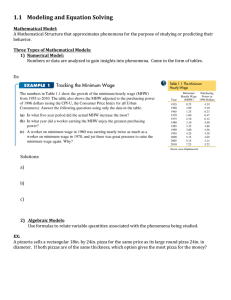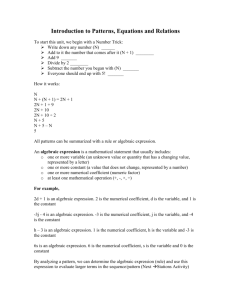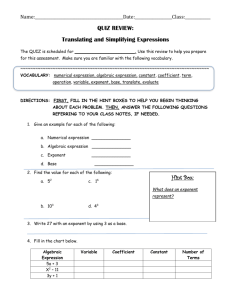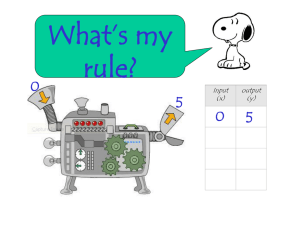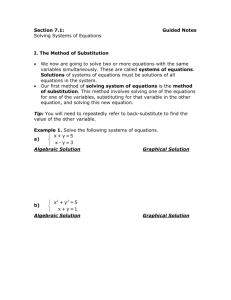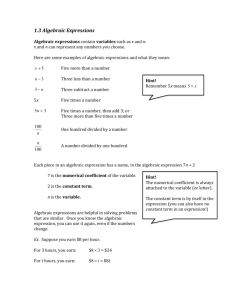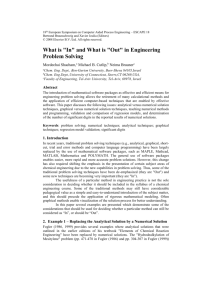Notesheet 1.1
advertisement
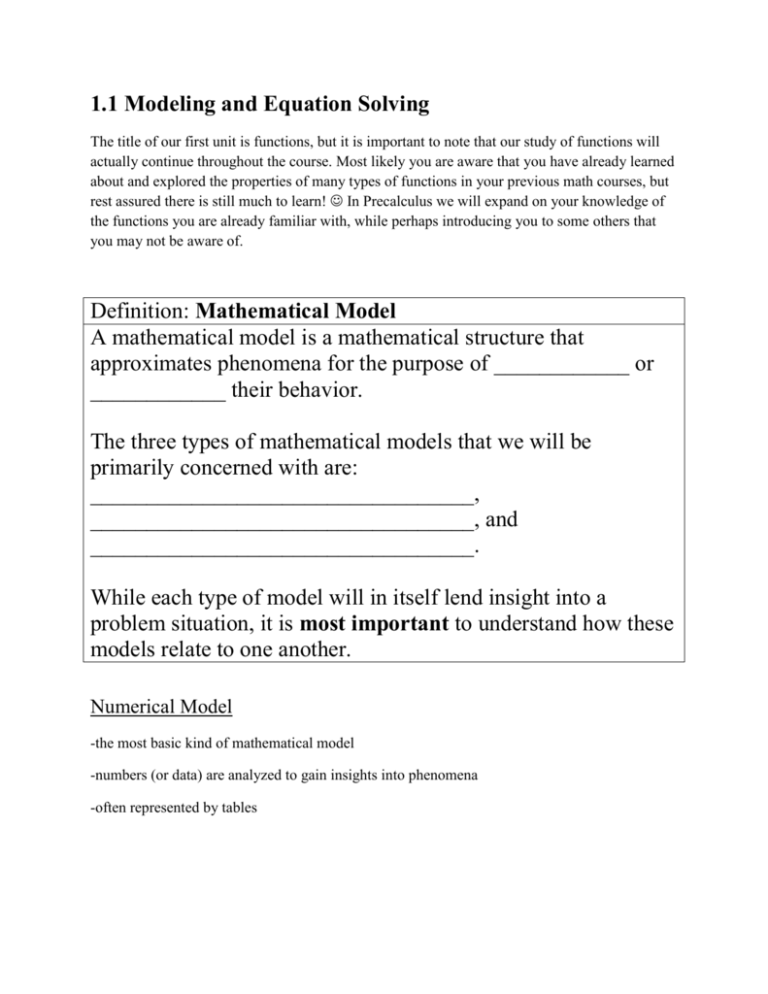
1.1 Modeling and Equation Solving The title of our first unit is functions, but it is important to note that our study of functions will actually continue throughout the course. Most likely you are aware that you have already learned about and explored the properties of many types of functions in your previous math courses, but rest assured there is still much to learn! In Precalculus we will expand on your knowledge of the functions you are already familiar with, while perhaps introducing you to some others that you may not be aware of. Definition: Mathematical Model A mathematical model is a mathematical structure that approximates phenomena for the purpose of ____________ or ____________ their behavior. The three types of mathematical models that we will be primarily concerned with are: __________________________________, __________________________________, and __________________________________. While each type of model will in itself lend insight into a problem situation, it is most important to understand how these models relate to one another. Numerical Model -the most basic kind of mathematical model -numbers (or data) are analyzed to gain insights into phenomena -often represented by tables Algebraic Model -uses formulas to relate variable quantities associated with the phenomena being studied -can generate numerical values for unknown quantities by relating them to known quantities -often explains the pattern seen in a numerical model Graphical Model -visible representation of a numerical model or an algebraic model -gives insight into the type of relationships occurring between variable quantities -the tedious process of creating graphical models is often simplified by using technology, such as a graphing calculator or computer Example 1: Illustrating Mathematical Models The table below shows the life expectancy for persons born in the United States in each given year. The data are drawn from census years between 1950 and 2010. Numerical Model: Years after 1950 0 10 20 Life Expectancy 68.2 69.7 70.8 What can we learn from the numerical model? 30 73.7 40 75.4 50 76.8 60 78.7 Graphical Model: Create a graphical model of this data below, remembering to include an appropriate title, scales, labels and units. Does the graphical model provide us with any additional insights? Explain. Algebraic Model: Use the graphical model you just created in order to suggest an algebraic model for this trend. You may wish to confirm the accuracy of your model using your graphing calculator. Example 2: Illustrating Mathematical Models Galileo Galilei spent a good deal of time rolling balls down inclined planes, carefully recording the distance they traveled as a function of elapsed time. Below is typical table of Galilean data, similar to one that you may have produced in your physics class. Numerical Model: Elapsed Time (sec) Distance Traveled (inches) 0 1 2 3 4 5 6 7 8 0 0.75 3 6.75 12 18.75 27 36.75 48 What can we learn from the numerical model? Graphical Model: Create a graphical model of this data below, remembering to include an appropriate title, scales, labels and units. Does the graphical model provide us with any additional insights? Explain. Algebraic Model: Use the graphical model you just created in order to suggest an algebraic model for this trend. You may wish to confirm the accuracy of your model using your graphing calculator. The Zero Factor Property The main reason for studying algebra through the ages has been to solve equations. Oftentimes important solutions for equations involve finding x-intercepts: the x-values that are associated with a y-value of zero. Note: x-intercepts may also be referred to as zeros or roots. For this reason, it will be important for you to have good algebraic skills, such as factoring, completing the square, and using the quadratic formula which we shall review right now. Definition: Zero Factor Property A product of real numbers is zero if and only if ___________________________________________________. Example 3: Solving an Equation using Various Methods Find all real numbers x for which 6𝑥 3 = 11𝑥 2 + 10𝑥. Solving by factoring: Solving by completing the square: Solving using the quadratic formula: Solving through the use of technology – graphically or numerically. Note: what types of errors can occur when trying to use technology to find a graphical solution to an equation?
